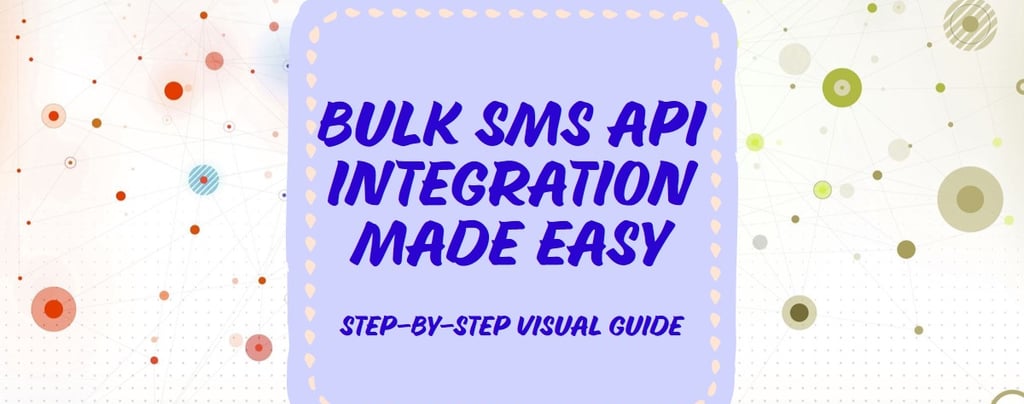Refer & save monthly charges on Business WhatsApp API, Call Now!
Harnessing the Power of Bulk SMS API: An In-Depth Guide
In an era where communication is the backbone of customer engagement, businesses must leverage effective tools to stay ahead. One such tool is the Bulk SMS API, a technology that has transformed how businesses interact with their audience. This comprehensive guide delves into the intricacies of Bulk SMS APIs, exploring their benefits, functionality, use cases, and how to choose the right provider for your business needs.
DIGITAL MARKETING
Mahendra Wahane
6/21/20246 min read


What is a Bulk SMS API?
A Bulk SMS API (Application Programming Interface) is a powerful software interface that enables businesses to send large volumes of SMS messages seamlessly. It integrates SMS capabilities into existing systems, applications, or websites, facilitating automated and efficient communication with customers. This technology bridges the gap between traditional communication methods and modern digital platforms, providing a streamlined solution for mass messaging.
Key Benefits of Using Bulk SMS API
High Delivery and Open Rates: SMS messages have an exceptionally high delivery rate and an impressive open rate, with over 90% of messages being read within three minutes of receipt. This ensures that your message reaches and is seen by your audience almost immediately.
Instant Communication: The immediacy of SMS makes it ideal for time-sensitive notifications such as OTPs (One-Time Passwords), alerts, and promotional offers. Messages are delivered within seconds, ensuring timely communication.
Cost-Effective Marketing: Compared to traditional advertising methods, bulk SMS is highly cost-effective. It offers a significant return on investment, making it an attractive option for businesses looking to maximize their marketing budgets.
Wide Reach: SMS can reach any mobile device, regardless of the model or operating system, ensuring your message is accessible to a broad audience.
Enhanced Engagement: The personal nature of SMS fosters higher engagement rates. Personalized messages can significantly enhance customer experience and loyalty.
How Does a Bulk SMS API Work?
Integrating a Bulk SMS API involves several key steps:
Selecting a Trustworthy SMS Provider: Start by choosing a well-established SMS gateway provider that delivers strong API functionalities. Look for providers with a track record of high delivery rates, reliability, and excellent customer support.
API Integration: Use the provided documentation and sample codes to integrate the SMS API with your application or website. This typically involves configuring API endpoints and setting up authentication protocols.
Authentication: Secure your API access with API keys or tokens provided by your SMS gateway. This step ensures that only authorized applications can send messages through your account.
Sending Messages: Craft your message and use the API to send it to your desired list of recipients. Most APIs support features such as message scheduling, personalization, and segmentation.
Tracking and Analysis: Monitor the delivery status and performance of your SMS campaigns through detailed reports provided by the API. Analyze metrics such as delivery rates, open rates, and customer responses to optimize future campaigns.
Comprehensive Use Cases for Bulk SMS API
Marketing Campaigns: Bulk SMS APIs are widely used for marketing campaigns due to their high open rates and immediacy. Businesses can promote new products, services, or events with personalized SMS marketing campaigns, driving customer engagement and sales.
Transactional Messages: Automated transactional messages such as order confirmations, shipping updates, and payment receipts keep customers informed and enhance their experience. These messages can be triggered by specific actions on your website or app.
Alerts and Notifications: Bulk SMS APIs are perfect for sending important alerts and notifications, such as account activity alerts, security notifications, and appointment reminders. This ensures timely communication and helps in maintaining customer trust.
Customer Support: Enhance customer service by enabling SMS-based support for quick and efficient problem resolution. Customers can send inquiries via SMS and receive prompt responses, improving overall satisfaction.
Surveys and Feedback: Collecting customer feedback through SMS surveys and polls is straightforward and effective. This data can be invaluable for improving products, services, and customer experience.
Internal Communication: Bulk SMS APIs can also be used for internal communication within an organization. Announcements, meeting reminders, and policy updates can be quickly disseminated to all employees.
Detailed Steps to Implementing a Bulk SMS API
Requirement Analysis: Determine your business needs and objectives for using bulk SMS. Identify the types of messages you need to send and the audience you want to reach.
Selecting a Provider: Research and choose an SMS gateway provider that aligns with your requirements. Consider factors such as delivery rates, pricing, customer support, and additional features like two-way messaging and analytics.
Setting Up the API: Sign up with your chosen provider and obtain the necessary API keys. Follow the provider's integration guide to set up the API within your system. This typically involves configuring endpoints, setting up authentication, and integrating with your existing software.
Testing: Conduct thorough testing to ensure the API is correctly integrated and functioning as expected. Send test messages to verify delivery rates, message formatting, and any personalization features.
Deployment and Monitoring: Once testing is complete, deploy the API for live use. Continuously monitor the performance of your SMS campaigns using the provider’s analytics tools. Track metrics such as delivery rates, open rates, and response rates to assess the effectiveness of your communication strategy.
Advanced Features of Bulk SMS APIs
Personalization: Modern SMS APIs allow for advanced personalization, enabling businesses to send tailored messages that address recipients by name and include relevant information. Tailored messages have the potential to greatly enhance both engagement and response rates.
Two-Way Messaging: Two-way messaging capabilities allow recipients to reply to messages, facilitating interactive communication. This feature is especially beneficial for gathering customer feedback and providing support.
Message Scheduling: Scheduling features enable businesses to plan and send messages at optimal times, improving the likelihood of engagement. Messages can be scheduled for specific times and dates based on customer behavior patterns.
Segmentation: Advanced APIs support audience segmentation, allowing businesses to target specific groups of customers with tailored messages. This ensures that messages are relevant and increases the effectiveness of campaigns.
Delivery Reporting: Detailed delivery reports provide insights into the success of SMS campaigns. Businesses can track metrics such as delivery rates, open rates, and click-through rates to measure performance and optimize future campaigns.
Multilingual Support: For businesses with a global audience, multilingual support is crucial. Bulk SMS APIs often support message sending in multiple languages, ensuring effective communication across different regions.
Choosing the Right Bulk SMS API Provider
When selecting a Bulk SMS API provider, consider the following factors to ensure you make the best choice for your business needs:
Reliability and Uptime: Ensure the provider guarantees high uptime and reliable message delivery. Downtime can disrupt communication and impact your business operations.
Scalability: Choose a provider that can handle your business's growing communication needs. The ability to scale up as your business expands is crucial for long-term success.
Security: Verify that the provider offers robust security measures to protect your data and communications. Look for features such as encryption, secure authentication, and compliance with data protection regulations.
Customer Support: Opt for a provider with excellent customer support to assist with any technical issues or queries. Responsive support can be a lifesaver in case of any problems or when you need assistance with integration.
Pricing: Compare pricing plans to find one that fits your budget without compromising on quality. Consider factors such as message rates, setup fees, and any additional costs for advanced features.
API Features and Documentation: Evaluate the features offered by the API and ensure they meet your requirements. Comprehensive documentation and sample codes can simplify the integration process and reduce development time.
User Reviews and Testimonials: Check user reviews and testimonials to gauge the provider’s reputation and performance. Positive feedback from other businesses can provide confidence in your choice.
Future Trends in Bulk SMS API
The landscape of SMS communication is constantly evolving, with several emerging trends shaping the future of Bulk SMS APIs:
AI and Automation: The integration of artificial intelligence (AI) and machine learning (ML) is transforming SMS marketing. AI-powered chatbots and automated responses enhance customer interactions and streamline communication processes.
Rich Communication Services (RCS): RCS is an upgrade to SMS that offers richer media content, including images, videos, and interactive elements. Bulk SMS APIs are increasingly supporting RCS, providing a more engaging communication experience.
Omnichannel Communication: Businesses are adopting omnichannel strategies to provide a seamless customer experience across various channels, including SMS, email, and social media. Bulk SMS APIs are becoming part of integrated communication platforms.
Enhanced Security: With increasing concerns about data privacy, SMS API providers are focusing on enhancing security measures. Features such as two-factor authentication (2FA) and end-to-end encryption are becoming standard.
Data Analytics and Insights: Advanced analytics and insights tools are being integrated into SMS APIs, allowing businesses to gain deeper understanding of customer behavior and campaign performance. Utilizing this data-centric method aids in refining communication strategies.
Conclusion
A Bulk SMS API is a powerful tool that can revolutionize how businesses communicate with their customers. By leveraging this technology, businesses can achieve high delivery and open rates, ensure timely and effective communication, and enhance customer engagement. Whether for marketing campaigns, transactional messages, alerts, customer support, or internal communication, a Bulk SMS API offers a versatile and reliable solution.
Implementing a Bulk SMS API requires careful planning, from selecting the right provider to integrating and testing the API. Businesses must also stay abreast of emerging trends to maximize the benefits of SMS communication. By choosing a reliable provider and utilizing advanced features, businesses can streamline their communication processes, improve customer satisfaction, and drive better business outcomes.






Subscribe to Our Newsletter
Business growth through SMS, Voice Call and WhatsApp
Useful Links
Refund Policy
© APACHE IT SOLUTIONS